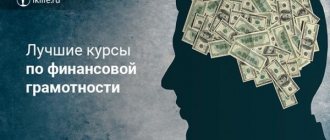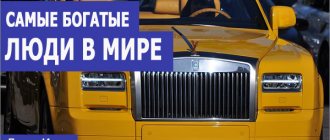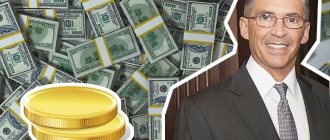Culture
Not everyone who is at the top today has always been successful.
Often, the most successful people in history have faced numerous obstacles that forced them to work harder and be more determined than others.
So the next time you feel upset about your failures, remember these people and that failure is just a step on the path to success.
1. Henry Ford
Today, his American company with an innovative assembly line is one of the largest in the automotive industry. However, his success was not immediate.
Young Henry Ford slightly tarnished his reputation by launching five different automobile ventures that failed. And only after that Ford Motor was founded.
2. Soichiro Honda
Honda began its billion-dollar business with a series of failures. Toyota Motor Corporation rejected Soichiro's application for an engineering position, and he was unemployed for a very long period of time. Having started making scooters at home, he gradually opened his own business.
3. Akio Morita
This name may not be familiar to you, but you probably know the world-famous company he founded, SONY. The company's first product was a rice cooker, which, unfortunately, did not cook rice, but burned it.
As a result, fewer than 100 units were sold. But this failure only emboldened Akio and his partners, who sought to create a multibillion-dollar company.
4. Bill Gates
Bill Gates seemed unlikely to succeed after leaving Harvard and starting his first failed venture, Traf-O-Data, with Microsoft co-founder Paul Allen. Despite the fact that the first case failed miserably, this did not stop Bill from wanting to move forward. This is how the global Microsoft empire was created.
Nick Woodman
Founder of the GoPro company, which produces video cameras and related accessories for extreme sports. His condition is currently assessed at $1,750,000,000.
Failures
He first created EmpowerAll.com, an e-commerce site specializing in extremely low-cost electronics. The company never made any profit, so it was quickly closed. This did not stop the future billionaire, so in 1999 he created FunBug, an Internet marketing company.
On the company's website, users had the opportunity to win cash prizes in exchange for participating in the sweepstakes. He even managed to raise $3.9 million in funding from various investors. The company seemed to be on the rise, but in 2001 Nick was forced to admit failure once again. He was unable to keep his company running smoothly and lost not only all his money, but also his investors' investments.
Lessons
Having lost his second company, Nick decided to quit everything and took up surfing. It was there that he came up with the idea of creating a camera that could be used for extreme sports. Thus GoPro was born.
I was so afraid that GoPro would end up in the same place as Funbug that I decided to work tirelessly. This was the main lesson I learned from past failures. I had no choice but to win.
Thomas Edison
As a child, Edison's teacher once told him that he was too stupid to learn anything. And before the first working light bulb appeared, he created about 9 thousand unsuccessful experiments. Given all this, no list of successful failures would be complete without Thomas Edison, owner of 1,093 patents, who gave the world many inventions that radically changed life in the 20th century. Although, they say that Edison was also that rogue and swindler who stole all his inventions from other scientists.
Bill Gates
Founder of Microsoft and one of the most significant charitable projects of our time. The richest man in the world, whose fortune is estimated at $72,700,000,000.
Failures
His first company was called Traf-O-Data and its goal was to read data from meters near busy roads and create reports for road authorities. Thus, they wanted to optimize traffic flows and avoid traffic jams.
Their first device was called Traf-O-Data 8008, it could count passing cars and process the resulting data. The firm initially tried to sell its services to local governments, but they bombed their first presentation because “the device didn’t really work,” Gates recalled.
Lessons
His partner, Poll Allen, recalled their first project this way:
Even though Traf-O-Data was not successful, it was the first step and preparation for the creation of Microsoft a couple of years later.
Fortunately for them and us, they did not give up their studies, but drew conclusions from the failure. They continued to believe in success and Microsoft became the largest manufacturer of personal computer software in the world.
Winston Churchill
Little Winston Churchill did poorly at school and had speech problems. In the 6th grade I was the last in terms of academic performance, the exams at the Royal Military School, where I also did not shine particularly well, passed only on the third attempt and lost in every government position that I held. However, at the age of 62, Churchill became Prime Minister of Great Britain during the Second World War. Today he is recognized as one of the most significant leaders in British and world history.
James Dyson
Famous English inventor and industrial designer, founder and head of Dyson. He has such diverse inventions as a special vessel known as a “sea truck”, a G-Force cyclonic vacuum cleaner, a digitally controlled electric motor, a hand dryer, and so on. The condition is currently assessed at $3,000,000,000.
Failures
Most people think that inventors are already born with a special invention gene, some special talent or gift. But in reality it's not like that. Becoming inventors is the result of hard work.
For example, when creating his vacuum cleaner, Sir James Dyson created 5,127 prototypes that could be considered “failed attempts.” He spent 15 years perfecting his product before introducing it to the market in 1993. This is how he remembers those times:
There are countless reasons for an inventor to abandon his idea. By the time I made my 15th prototype, my third child was born. When it came to the 2627th design, my wife and I really made every penny count. During the creation of sample 3727, my wife was already giving painting lessons to obtain at least some additional funds. These were difficult times, but each failure brought me closer to solving the problem.
Lessons
Inventors are the biggest losers you can find. And this is the only way in which you can create something truly new. And it is important to clearly understand this. As Edison said about this: “I have not had any failures. I just found 10,000 ways that don't work." Sir James Dyson seems to have grasped this truth well.
Interesting facts about famous people
5. Harland David Sanders
The well-known Colonel Sanders on the KFC logo is him, the founder of Kentucky Fried Chicken, who initially had great difficulty selling his chicken. His famous secret chicken recipe was rejected 1,009 times before one restaurant finally accepted it.
6. Walt Disney
Disney now makes billions from merchandise, movies and theme parks around the world. At the very beginning of his career it was very difficult for him. He was fired from his job by a newspaper editor, saying that Walt lacked imagination and good ideas.
Steve Jobs
We all know Steve Jobs as the entrepreneurial guru, the genius behind the development of best-selling and desired products such as the iPod, iPad, iPhone and MacBook. He is the most influential business figure of our time and some call him the Leonardo da Vinci of our tech era. His total wealth is estimated at $10,200,000,000.
Failures
Many people only remember those Apple devices that brought this company to the top. But not everyone remembers the mediocre, strange or outright failed projects of this company. Lisa, Macintosh Portable, MessagePad, PowerBook Duo, Pippin - do these names mean anything to you? And these are all not very successful developments of the apple company, which even almost led to its complete collapse. As a result, a well-known fact in Jobs’ biography happened when he was kicked out of the company he headed.
Lessons
And only after such a crushing fiasco did Jobs finally “ripen” to the point that subsequently brought him and his company such powerful success. His dream of creating "a company that would be a generation or two ahead of everyone else, like names like Walt Disney, Hewlett Packard or Intel" was finally realized.
Walt Disney
The man who gave the world Disneyland and one of the cult figures of popular culture, Mickey Mouse, was fired from the newspaper for “lack of imagination and lack of original ideas.” His first animation studio went bankrupt. According to legend, Disney was rejected 302 times before he received funding to create Disneyland. Today it is difficult for us to imagine our childhood without the amazing cartoons of this great producer, director, screenwriter and animator. And although one of the most famous animators of all time has suffered more than one failure in several of his endeavors, today the corporation known as The Walt Disney Company earns an average of about 30 billion dollars a year.
Failures
If you met Branson in his youth, you wouldn't bet a cent on him being successful. He struggled with reading and math skills, and at age 16 he left high school without completing his studies. Not exactly the right set of qualities for a future billionaire.
His first attempt at business—publishing a student magazine, which he started when he was 16—had problems with law enforcement. Richard almost went to prison for publishing an advertisement for a cure for sexually transmitted diseases in a magazine.
Do you think that's all? Oh no, Richard doesn't stop there! In 1971, Branson was arrested and accused of selling records in Virgin stores that were declared as export goods. He settled a legal case with England Customs and Excise with an agreement to pay unpaid duty and fines. Branson's mother remortgaged the family home to help pay the claims.
Lessons
Life taught a tough lesson to this restless adventurer.
I swore to myself that I would never again do anything that would put me in jail or at least in a business that looked shady. Everyone learns from mistakes. If you are an entrepreneur and your first business was a failure, then welcome to the club!
Albert Einstein
Albert Einstein is the most prominent example of great failures, earning the top spot on the list. As a child, he began speaking only at age 4 and could not learn to read until age 7. He studied so poorly that teachers (and parents) considered him “stupid” and “mentally retarded” and said that he would never achieve anything. But Einstein simply thought differently. In 1921, he received the Nobel Prize in Physics for his explanation of the photoelectric effect and "for his services to theoretical physics." Theoretical physicist, one of the founders of modern theoretical physics, public figure-humanist, honorary doctor of about 20 leading universities in the world, member of many Academies of Sciences, author of more than 300 scientific papers and about 150 books and articles in various fields, who developed several significant physical theories and who predicted “quantum teleportation”, is today considered one of the most prominent scientists of the 20th century.
Conclusion
The truth is that in order to be on the list of the richest people in the world, you have to take a fair amount of risk. And risk almost always comes with failure. It's easy to look at these billionaires and say, “It's just luck. They got help. It’s all their parents or some kind of secret force.”
But the reality is that 73 of the world's first 100 billionaires achieved this on their own. There is no conspiracy or secret recipe here. They just work harder than everyone else. They simply did what everyone else only dreams of. And they never stopped after the next blow, but continued to move forward. Learning from failures and turning defeats into victories.
Soichiro Honda
After World War II, Soichiro Honda was rejected during an interview for an engineering position at Toyota Motor Corporation. An unemployed, self-taught mechanic began making motorcycles that his neighbors bought, which led to the opening of his own, which grew into the largest international industrial manufacturing company of cars and motorcycles, surpassing GM and Chrysler, and making its founder a billionaire.
Burt Reynolds
Business: two restaurant chains
Photo: Getty Images
It must be that celebrities and restaurants cannot exist without each other. Entering the food service industry seems to be one of the most popular ways for celebrities to fail in business. Burt Reynolds, a famous actor whose popularity peaked in the 70s and early 80s, first invested in the PoFolks restaurant chain based in South Carolina.
By 1984, the size of the chain had grown beyond 100 establishments. Around this time, Reynolds, in partnership with music manager Buddy Killen, bought 30 franchises in Texas, Florida and Louisiana and founded , Reynolds said at the time.
Unfortunately, he and Killen each spent $20 million on this business. Then they invested in the Daisy Diner chain, which also did not become profitable, but helped them spend another $10 million. All this, as well as a very expensive divorce from Loni Anderson, led to Reynolds' bankruptcy in 1996.
Coco before Chanel
Year of release: 2009.
Country: France, Belgium.
Key roles: Audrey Tautou, B. Pulvoord, A. Nivola and M. Gillen, etc.
This film adaptation of the biography of the famous female fashion designer would not have been so wonderful if it were not for the excellent work of the entire film crew and the performance of Audrey Tautou, who fantastically played the role of the legendary Coco.
Coco before Chanel
The film tells the story of the times when Coco was an unknown Gabrielle Chanel, a strong woman who once hid her past under a “little black dress.”
The title of the film uses the preposition “Before” instead of “De”, as a reflection of the essence of the film - the biography of Coco Before the moment when success befell her.
Kardashian sisters
Business: Prepaid Debit Card
Photo: Getty Images
Some ideas seem to fail from the start. For example, the idea of the Kardashian sisters - goddesses of unbridled consumption (simply because they can afford it) - to issue a prepaid debit card for young people seemed strange, to put it mildly. Then Connecticut Attorney General Richard Blumenthal took a closer look at the KardashianKard project and discovered that the problem was not just the idea.
Blumenthal sent a letter to Bank , which issued the card, questioning the legality of these actions due to “criminally high tariffs.” The prosecutor wrote: “With this card, it is simply impossible to equal Kardashian’s level of wealth.” Less than a month after the launch, the reality stars stopped producing the cards.
Kiss for good luck
Year of release: 2006.
Country: USA.
Key roles: L. Lohan and K. Pine, S. Armstrong and B. Turner, etc.
Beautiful Ashley is lucky in everything - she is lucky in work, with friends, in love, and even taxis stop at once with a wave of her hand.
Kiss for good luck
But one day an accidental kiss at a carnival turns her life upside down: by giving a kiss to an unfamiliar “loser”, she gives him her luck. How can I now regain my luck and find the young man whose face was hidden by a mask?
A funny, cheerful picture that will teach you the right attitude towards failures!
Bela Lugosi
Lugosi's career, which began in the Hungarian theater, continued in Hollywood, where he played horror movie villains such as Dracula in the 1931 film.
This ultimately worked against him: the actor was too stuck in the image of gothic villains, and he was not invited to other roles. The Hungarian accent, which was part of his image, also backfired on him.
By the 50s, Lugosi's star had sunk so low that he was forced to live in poverty and act in the most low-quality films. In 1956, when he was 73, the actor died at home on an ottoman from a heart attack.
Steven Spielberg
One of the most popular film directors in the USA. He became interested in cinema as a child. His father gave him a video camera. 12-year-old Stephen began making his first films and even won an amateur film competition. It seemed that he had every chance of further development in this area. Spielberg decided to get an appropriate education and applied to the School of Cinematic Arts. He tried to enroll there twice, but was rejected with the words “too mediocre.”
Stephen was accepted into a technical college without any problems, but he did not give up his dream and continued to make films. Soon his talent was noticed by Universal Pictures. After the premiere of the film “Jaws,” Spielberg woke up famous. Everyone who had previously rejected his ideas began to offer him cooperation. Now Steven Spielberg is a three-time Oscar winner, most of his films have become box office hits, and audience interest is the highest reward for a director.
Sam Walton
pixelpackr/flickr.com
The founder of the Walmart chain started by renting space for his first store for 5 years. Walton began to build a unique corporate culture in it, which made the store very popular. And after 5 years, the owner of the premises refused to renew the lease and gave the promoted place as a store to his son. Walton had to start all over again in another city.
Joanne Rowling
At one point in her life, JK Rowling was penniless, deeply depressed, divorced, unemployed, forced to raise her daughter on her own on social security, while simultaneously writing the manuscript of the first Harry Potter book. So that life would not seem entirely sweet, this manuscript was rejected by 12 publishers. Today, Rowling is an internationally recognized genius for her 7 Harry Potter books, which has become a global brand valued at $15 billion. This is the first case of a billionaire making money from writing.
Curt Schilling
Business: video game development startup
Photo: Bloomberg
There haven't been many business failures as high-profile in recent memory as baseball great Curt Schilling's video game startup 38 Studios. The Rhode Island-based studio has only released one video game, Kingdoms of Amalur. In 2012, Schilling fired the company's entire staff of 379 people and began bankruptcy proceedings. However, the problems went far beyond the losses of the company and its founder.
Schilling and his partners took out a $75 million loan from the state of Rhode Island (the state issued bonds to back the loan in order to lure Schilling's company from neighboring Massachusetts) and could not pay it back. Legal proceedings began. The state filed a lawsuit against 38 Studios, accusing the company of falsifying financial statements to obtain a loan. In September 2016, Schilling and former 38 Studios executives agreed to return just $2.5 million to the state, leaving taxpayers with nothing. According to bankruptcy filings, the company has accumulated $150 million in debt with only $22 million in assets. According to Schilling, he himself invested $50 million of personal funds into the company.
Barefoot on the pavement
Year of release: 2005.
Country: Germany.
Key roles: T. Schweiger and J. Vokalek, N. Tiller and others.
Nick is a pathological loser. He has no luck in work, in life, and his family considers him a complete loser.
Tired and mired in apathy, Nick gets a job as a cleaner in a psychiatric hospital - and accidentally saves Lila from suicide.
Barefoot on the pavement
The grateful girl escapes from the hospital after Nick wearing only a nightgown, and all attempts to get rid of her end in failure. A journey together changes the lives of this strange couple forever.
An atmospheric, fantastically realistic movie that will make you want to walk barefoot along the pavement...
Friedrich Nietzsche
The controversial German writer Friedrich Nietzsche built his philosophical system on the denial of compassion and on the slogan “The Will to Power,” which, according to his views, is inherent in the superman - a person who does not care about the feelings of “lower” people.
Ironically, Nietzsche met his end while suffering from a mental disorder that first manifested itself in the horse episode. Witnesses said that one day he saw an animal being beaten with a whip, ran up to it and hugged it, trying to protect it. At the end of his life, Nietzsche was cared for by his elderly mother, and then by his sister Elisabeth.
Britney Spears
Business: restaurant
Photo: WireImage
Britney Spears became famous not only for her music, but also for other things, such as reality shows and movies (Crossroads). However, her participation in the restaurant life of New York cost her no less than filming.
A restaurant called Nyla specialized in Cajun cuisine (Spears is originally from Louisiana). But things quickly became very bad for the restaurant. Nyla, located in the Dylan Hotel building in Manhattan, opened in June 2002, and Spears pulled out after just five months. Gradually the best chefs left, several small violations were noticed that could harm the health of the guests, and the menu changed to Italian.
At the time of closing, Nyla's owners owed creditors $400,000, according to bankruptcy filings.
7. Akio Morita
The founder of the largest corporation, Sony, also had to overcome many difficulties. Akio Mortita's family was wealthy. A family business, his father was involved in the production of the national Japanese drink - sake. He hoped that Akio would continue his work, but the young man disappointed his father by entering the Faculty of Physics and Technology. A few years later, the man nevertheless forgave his son and even allocated him a small capital, which became the starting capital for. Akio dreamed of inventing something fundamentally new. One of his first projects was a rice cooker. We managed to sell no more than 100 pieces, the rice was burnt. Morita did not give up. He continued to work, and soon his technique became in demand.
His goal was for the “Made in Japan” label on a product to become a kind of sign of high quality. Sony currently ranks third among all Japanese corporations engaged in the production of electronics in Japan.
Lenny Dykstra
Business: financial services, publishing, air charter, car wash
Photo: Los Angeles Times
The controversial baseball player Lenny Dykstra, who played for the New York Mets and Philadelphia Phillies, after finishing his sports career, tried himself in a variety of areas of business. For a time, he ran a profitable chain of car washes in South Carolina, but then he was sued by his partner and relatives for causing financial harm to the company.
Dykstra became a stock analyst and wrote a column for TheStreet.com. Then he founded the company The Players Club, which was engaged in publishing a financial magazine, charter flights and investments at the same time. The company was intended primarily for professional athletes, but did not bring any noticeable profit.
When this became known, everyone - from banks to Dykstra's own brother - began to sue him for unpaid bills. He declared himself bankrupt and listed his assets at $50,000 with debts of $10 million. To pay for them, Dykstra's estate in California was confiscated for $17 million, which, as it turned out, was not properly maintained.
Federal authorities filed charges and the baseball player pleaded guilty to fraud, money laundering and concealing assets during bankruptcy proceedings. Dykstra recently wrote a memoir called House of Nails. Now Dykstra is being sued again, this time by a man who claims he didn't pay him for promoting the book on social media.
Michael Jordan
Michael Jordan
For basketball fans, Michael Jordan is like a superhero—at least on the basketball court. Legends are still made about his skill; the achievements of the great athlete are truly impressive - two Olympic gold medals, six NBA championship titles, in addition, Jordan was recognized as the most valuable player of the season five times. To achieve all this, Michael had to overcome himself and prove that his height does not matter - at the very beginning of the champion’s career he was considered too short for basketball.
In his youth, Michael and his older brother Larry were relaxing at a children's sports camp and he was offered to play for the college basketball team. The talent of the future basketball legend pleasantly surprised the coaches, but Jordan was not accepted into the team - by basketball standards, his growth was not very outstanding. At the end of the season, not finding his name on the list of the permanent team, Michael decided that all his dreams were over, and when he returned home, he even burst into tears. Fortunately, the loving mother did not allow her son to give up his sports career and insisted that Michael continue to improve his skills. Jordan himself, already a champion, recalled: “Mom said that the best thing I can do is prove to the coach that he was wrong.”
Judy Garland
Judy, best known for her role as Dorothy in the classic film The Wizard of Oz, has had a difficult life, both emotionally and financially.
She did not have the appearance of a typical Hollywood beauty, so the producers persistently changed her image. This could not but affect her further emotional problems. By the end of the 40s, it became very difficult to work with her, she was often late for filming or did not show up at all.
The actress’s personal life also did not go well: both of her marriages fell apart. In addition, towards the end of her life she found herself in debt. Garland died in 1969 from an accidental overdose of barbiturates.
The third part of “Sex and the City” will be released, but without one heroine
What to expect in 2021: Jemima Packington predicts the future using asparagus
Strange garden decoration in New Zealand attracts curious tourists
Jay Z
Business: boutique hotel
Photo: Getty Images
Rapper Jay Z (real name: Shawn Carter) knows how to do a lot of things right in business, but some things still went wrong. In 2007, Jay Z teamed up with construction magnates Charles Bikeman and Abram Schnay to purchase the former Time Warner Cable warehouse in Manhattan. They planned to open the first of the future J Hotels chain of boutique hotels there.
However, the cooperation ended in 2009 after a loan of $52 million, and then a lawsuit between former partners and creditors. After a series of lawsuits and counterclaims, the case was dropped in 2010 after Jay Z transferred ownership of the building to a company owned by his creditors.
Theodor Geisel
Theodor Geisel
Throughout the world, Geisel is better known as Dr. Seuss - under this pseudonym he wrote several children's books that have become real classics of children's literature, and in English-speaking countries children are still taught to read based on Dr. Seuss's books.
Of course, Geisel was not born successful and wealthy - for example, before his first work entitled “Just Think What I Saw on Mulberry Street” was published, publishers rejected the young author 27 times.
The publishing industry sharks told Geisel that his story about the power of children's imagination was meaningless and of no interest to either children or adults, and the writer was ready to give up. One day, Geisel was walking along the street of New York, thinking about yet another discouraging refusal, and accidentally met an old friend who, as it later turned out, was the editor of the children's department of one of the New York publishing houses. After reading Geisel's essay, the editor decided to publish it and soon the name of Dr. Seuss thundered throughout the world.
Henry Ford
Henry Ford
Henry Ford is without a doubt one of the most outstanding people of his time - having developed the basic principles of assembly line production, Ford revolutionized not only the production of cars, but also a wide variety of industries. It was he who created the first mass-produced car in history, the Ford T, which not only the rich, but also people with average incomes could afford to buy.
On the path to success, Henry encountered two failures, which, fortunately, were not fatal to his career. The first company founded by Ford was called the Detroit Automobile Company - its sponsor was entrepreneur William H. Murphy, and Ford himself was directly involved in the development and production of cars. A year and a half after opening, the investor closed the enterprise - due to the inexpressive appearance of its products, sales were scanty. Henry Ford persuaded Murphy to give him more money and created another company called Henry Ford Company, however, this idea also failed - production turned out to be unprofitable, so Ford’s first two automobile “pancakes” came out lumpy.
Alexander Malcomson
After leaving the company and ending his cooperation with Murphy, Ford established a business relationship with coal merchant Alexander Malcomson, a Scotsman by birth, who financed the next endeavor of the ambitious Henry. By improving the design of cars, Ford made the new company profitable, and gradually the Ford Motor Company became one of the world leaders in car production and remains so to this day.











